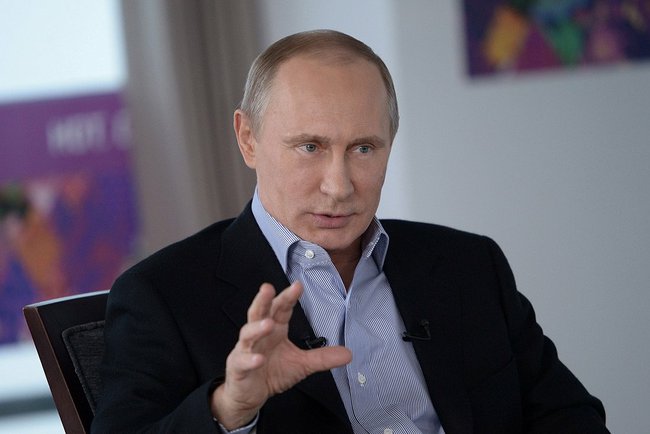Editor’s note: In the chess match that is imperial politics, entire nations and ecosystems are pawns that are bargained with and sacrificed. As war tears across Ukraine, we insist that neither the U.S. nor NATO or Russia is innocent. The dire truth is that empires produce wars, and thus the path towards peace ultimately means dismantling empires.
Vladimir Putin’s attack on Ukraine is undoubtedly illegal and immoral. From the point of view of Russian interests, it is also likely to prove a costly mistake. The primary question now, however, is what to do about this, and the answers presented thus far by those outraged by the invasion are dangerously counterproductive.
“Putin must be punished,” the Americans and Europeans insist. But the forms of punishment now being implemented – severe economic sanctions and military aid to Ukraine – are designed to prolong the military struggle and to cripple the Russian economy, apparently on the theory that Russia’s discontented masses and oligarchs will then replace Putin with a leader more to the West’s liking. Pardon me, but this makes little sense. Prolonging the conflict will kill more Ukrainians and Russians, inspire their compatriots and loved ones to seek revenge. It may also bring the world close to nuclear war. Moreover, making a whole people suffer usually unites them against their adversary rather than turning them against their leader.
The array of punishments administered and proposed also indicate that many Westerners consider Putin analogous to Adolf Hitler and a return to the negotiating table the equivalent of Munich-style appeasement. But this betrays a profound misunderstanding of what drives the conflict and who the conflicting parties really are. Vladimir Putin is not an evil mastermind bent on world domination and the genocidal destruction of “inferior” races. He is the brutal leader of a once great empire playing the imperial game in a world of competitive empires. More brutal than Harry Truman in Korea, Lyndon Johnson in Vietnam, or George W. Bush in Iraq? Obviously not. Then why consider his bad character the primary cause of the struggle?
One reason seems clear. As conflict analysts recognize, it is common for each side in a violent struggle to consider the opponent’s malice and cruelty to be the conflict’s sole cause. “They are evil aggressors who choose to fight. We are virtuous defenders who fight because we have to.” This is exactly how the editors of the New York Times describe the war in Ukraine. They put it like this:
. . . none of the pretexts for war that Mr. Putin churned out in recent days and weeks contained much truth or any justification whatsoever for waging war on a weaker neighbor. This is a war of choice for all the wrong reasons, and Mr. Putin and his coterie are solely and fully responsible for every drop of Ukrainian – and Russian – blood, for every livelihood destroyed and for all the economic pain engendered by the conflict.[1]
I suppose that half a truth is better than no truth at all, and this is precisely half the truth. Putin did invade Ukraine without being militarily attacked. Some of the reasons for war he offered (for example, the alleged non-existence of a Ukrainian nationality) were fabrications. Other reasons, such as the U.S./European refusal to halt the expansion of NATO, were quite true, but they do not justify bombing and killing innocent people.
Where the Times editorial goes off the tracks, however, is in asserting that the Russian leaders are “solely and fully” responsible for the violence engulfing Ukraine. In fact, they are one of the responsible parties, but only one. The causes of this struggle go far beyond Mr. Putin’s bad choices, and solving the problems that produced the conflict go far beyond punishing the Russians. The causes of this conflict are systemic, which means that others in addition to Putin and his cohorts must share responsibility for the current violence.
“Systemic” means that there is a system – a form of social organization supported by patterns of thought, speech, and behavior – that structures the relations between states and peoples involved in conflict. The word that best describes our current system is imperial. Four major empires currently compete for regional hegemony and global superiority. In order of economic and military power, they are the multinational blocs dominated by the United States, China, Europe, and Russia. Several up-and-coming regional powers like Turkey and Iran have also asserted their influence in imperial style, but the major players in the Ukraine crisis are the U.S., Europe, and Russia, with China a potential participant.
The eruption of violence in this case should not have come as a surprise. Imperial systems produce violent conflict as a regular product of their operations. Often, subject peoples rebel, inciting imperial leaders to repress the dissidents, and enticing competing empires to come to their support. Often, empires challenge each other’s right to rule, particularly in disputed boundary areas – a form of competition that has produced both proxy wars and world wars. Ukraine is a prize in the competition between the American empire, assisted by its European junior partner, and Russia, morally supported by its Chinese ally. There are many historical analogies to this situation, some of them quite frightening. For example, the competition over independence-seeking Serbia between the Austro-Hungarian empire, supported by imperial Germany, and the Russian empire, supported by Great Britain and France, led directly to World War I.
Of course, empires do not always assert their interests by going to war. Negotiations can be used to settle their disputes at least temporarily, even if the system as a whole tends to generate mass violence. The current tragedy befalling Ukraine was avoidable, but avoiding it required more than patience or a change of heart by Mr. Putin. The invasion could almost certainly have been averted if the Americans and Europeans had agreed to stop expanding NATO and to treat Ukraine as a neutral buffer state, as they did after World War II in the cases of Austria and Finland. As in those cases, Ukraine’s rights to autonomy in certain spheres (e.g., economic decision-making) could have been recognized while restricting its right to become a military ally of either empire. But there is no evidence that the Western powers took the Russian demands seriously enough to entertain any such proposal.
Why not? On Putin’s watch NATO doubled its size, established army and air bases throughout Eastern Europe, and created two “super-bases” including missile facilities in Poland and Romania. Meanwhile, the U.S. continued to maintain more than 800 military bases around the globe and to modernize its nuclear facilities with the aim of threatening (or “deterring”) its Russian and Chinese competitors. The rationale for this aggressive posture was the adversary’s alleged tendency to aggress – a classic piece of circular conflict reasoning. In 2013, Ukraine’s elected leader supported a move to link his nation more closely with Russia than with Europe. In response, an uprising backed by the West overthrew him and installed a pro-Western regime in Kyiv. Russia responded to this apparent aggression by seizing Crimea, a former Russian territory inhabited by Russian-speakers, and by supporting separatists in the Donbass region. This alleged aggression then became a reason for Ukrainian and Western leaders to intensify their campaign to bring Ukraine into the Western orbit.
All this was part of a larger pattern of conflict between empires. What Putin had been demanding for years was an end to the post-Cold War system that treated Russia as a defeated but hostile power forbidden to assert its own security concerns and to increase its influence in the world. In 2019, the Carnegie Endowment for International Peace, hardly a pro-Russian organization, summarized this policy accurately:
U.S. policy toward Russia since the end of the Cold War is a story of different administrations pursuing essentially the same set of policies. Two aspects stand out as major irritants in the bilateral relationship: a refusal to accept Russia as it is, as evidenced by repeated initiatives to reform and remake its political system; and the extension of the Euro-Atlantic security architecture into the Eurasian space surrounding Russia. Both of these highly ambitious pursuits have been attempted repeatedly and unsuccessfully, yet both continue to be cornerstones of official U.S. policy toward Russia. In retrospect, it is hard to escape the conclusion that a less ambitious U.S. approach to dealing with Russia and the states of the former Soviet Union could have established a better basis for a less rocky U.S.-Russian relationship.[2] (Emphasis added)
What the Carnegie analysis did not recognize, however, was that this is how empires customarily operate. If they do not entirely erase their enemies, as the Romans did to Carthage, or remake their societies from the ground up, as the U.S. did to the Axis powers after World War II, they treat them as political and military adversaries that must be kept weak and dependent. Unsurprisingly, those subject to such restrictions and humiliations resent their subordination, dream of restoring lost glory, and insist on holding fast to what remains of a diminished empire. Untrusted and scorned by their victors, they return that distrust and view the weapons pointed at them as intolerable existential threats.
For this reason, Vladimir Putin’s cruelly mistaken decision to invade Ukraine was not only the result of the Russian leader’s hubris and insecurity. It was also the result of a desperation created by the hubris and insecurity of the Western empires. To ignore that conflict’s deeply structural nature is to take sides in a game of “blame the evil enemy” that attributes violence to a leader’s bad character rather than holding the imperial system itself responsible. Moreover, it impoverishes our understanding of the conflict by simplifying the narrative to the point that the only relevant issue seems to be Ukraine’s right to self-determination. In a world dominated by competing empires, movements for national self-determination frequently trigger violent conflicts – and sometimes world wars.
What can be done in this case to head off an increasingly destructive and dangerous escalation of the conflict? The immediate answer is to continue the peace negotiations now taking place between Russia and Ukraine. Despite propagandistic depictions of the Russians as engaged in an all-out war to kill civilians and destroy Ukrainian society, their relatively slow and discriminating advance, at this point without air support, suggests a continuing willingness to negotiate a solution that does not require either “shock and awe” military tactics or occupation of the country. If these negotiations do achieve a cease-fire, the next step will be to convene a peace conference that could reconsider Russia’s original demands, as well as dealing with the new fears and concerns created by the war itself.
This sort of negotiation is clearly preferable to continued escalation, but one must recognize that, in a world still dominated by competing empires, power-based negotiations are unlikely to resolve conflicts sustainably. The imperial system itself, linked to an elite-driven, predatory capitalism and militarism, desperately needs to be transformed. Popular movements to dismantle the empires and to create a more democratic and peaceful world order are the only real alternative to a competition that is likely to end in nuclear war.
To some, this hope may seem like “pie in the sky,” but there is far more support for anti-imperial, pro-human mobilizations than you may think. To stop demonizing leaders and shine the full light of criticism on the empires could be a first step toward unleashing this potential.
Notes.
[1] “Mr.Putin Launches a Sequel to the Cold War,” New York Times, February 24, 2022.
Rich Rubenstein was educated at Harvard College (B.A. 1959), Oxford University, where he was a Rhodes Scholar (M.A. 1961), and Harvard Law School (J.D. 1963). Before joining the George Mason faculty in 1987, he practiced law in Washington, D.C., taught political science at Roosevelt University in Chicago, and was professor of law at the Antioch School of Law. He is the author of eight books, including REBELS IN EDEN (1970), ALCHEMISTS OF REVOLUTION: TERRORISM IN THE MODERN WORLD (1985), and three books about religious conflict: WHEN JESUS BECAME GOD (1999), ARISTOTLE’S CHILDREN (2003), and THUS SAITH THE LORD: THE REVOLUTIONARY MORAL VISION OF ISAIAH AND JEREMIAH (2006).
Rich is an expert on American foreign policy, religious conflict, terrorism, and methods of resolving serious international and domestic disputes. He teaches courses at ICAR on Critical Conflict Theory, Religion and Conflict, Popular Narratives of War and Peace, Political Violence, and other subjects. He has lectured throughout the U.S.A. and Europe on topics ranging from the philosophy and practice of conflict resolution to the war on terrorism and current conflicts in the Middle East, and has appeared on numerous radio and television shows and in filmed documentaries discussing these issues. He is a frequent speaker at churches, synagogues, mosques, and religious seminaries, as well as universities and NGOs. He currently lives in Washington, D.C.
Image Courtesy: www.kremlin.ru, Licensed under Creative Commons Attribution 3.0 Unported | Wikimedia Commons.





